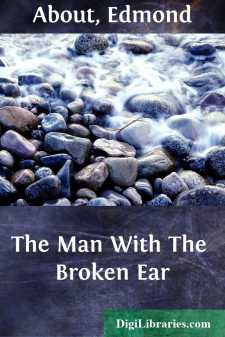Categories
- Antiques & Collectibles 13
- Architecture 36
- Art 48
- Bibles 22
- Biography & Autobiography 813
- Body, Mind & Spirit 142
- Business & Economics 28
- Children's Books 17
- Children's Fiction 14
- Computers 4
- Cooking 94
- Crafts & Hobbies 4
- Drama 346
- Education 46
- Family & Relationships 57
- Fiction 11829
- Games 19
- Gardening 17
- Health & Fitness 34
- History 1377
- House & Home 1
- Humor 147
- Juvenile Fiction 1873
- Juvenile Nonfiction 202
- Language Arts & Disciplines 88
- Law 16
- Literary Collections 686
- Literary Criticism 179
- Mathematics 13
- Medical 41
- Music 40
- Nature 179
- Non-Classifiable 1768
- Performing Arts 7
- Periodicals 1453
- Philosophy 64
- Photography 2
- Poetry 896
- Political Science 203
- Psychology 42
- Reference 154
- Religion 513
- Science 126
- Self-Help 84
- Social Science 81
- Sports & Recreation 34
- Study Aids 3
- Technology & Engineering 59
- Transportation 23
- Travel 463
- True Crime 29
The Roman Question
by: Edmond About
Categories:
Description:
Excerpt
CHAPTER I.
THE POPE AS A KING.
The Roman Catholic Church, which I sincerely respect, consists of one hundred and thirty-nine millions of individuals—without counting little Mortara.
It is governed by seventy Cardinals, or Princes of the Church, in memory of the twelve Apostles.
The Cardinal-Bishop of Rome, who is also designated by the name of Vicar of Jesus Christ, Holy Father, or Pope, is invested with boundless authority over the minds of these hundred and thirty-nine millions of Catholics.
The Cardinals are nominated by the Pope; the Pope is nominated by the Cardinals; from the day of his election he becomes infallible, at least in the opinion of M. de Maistre, and the best Catholics of our time.
This was not the opinion of Bossuet; but it has always been that of the Popes themselves.
When the Sovereign Pontiff declares to us that the Virgin Mary was born free from original sin, the hundred and thirty-nine millions of Catholics are bound to believe it on his word. This is what has recently occurred.
This discipline of the understanding reflects infinite credit upon the nineteenth century. If posterity does us justice, it will be grateful to us therefor. It will see that instead of cutting one another's throats about theological questions, we have surveyed lines of railway, laid telegraphs, constructed steam-engines, launched ships, pierced isthmuses, created sciences, corrected laws, repressed factions, fed the poor, civilized barbarians, drained marshes, cultivated waste lands, without ever having a single dispute as to the infallibility of a man.
But the busiest age, the age which the best knows the value of time, may be obliged for a moment to neglect its business. If, for instance, it should remark around Rome and its Bishop a violent agitation, which neither the trickery of diplomacy nor the pressure of armies can suppress; if it perceive in a little corner of a peninsula a smouldering fire, which may at any moment burst forth, and in twenty-four hours envelope all Europe, this age, prudent from a sense of duty, on account of the great things it has to accomplish, turns its attention to the situation of Rome, and insists upon knowing what it all means.
It means that the simple princes of the middle ages, Pepin the Brief, Charlemagne, and the Countess Matilda, behaved with great liberality to the Pope. They gave him lands and men, according to the fashion of the times, when men, being merely the live-stock of the land, were thrown into the bargain. If they were generous, it was not because they thought, with M. Thiers, that the Pope could not be independent without being a King; they had seen him in his poverty more independent and more commanding than almost any monarch on the earth. They enriched him from motives of friendship, calculation, gratitude, or it might even be to disinherit their relations, as we sometimes see in our own time. Since the days of the Countess Matilda, the Pope, having acquired a taste for possession, has gone on rounding his estate....



